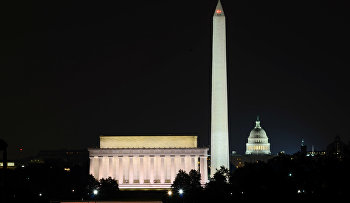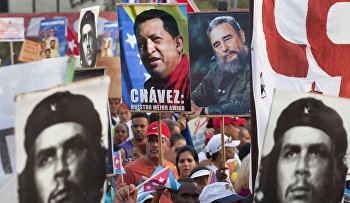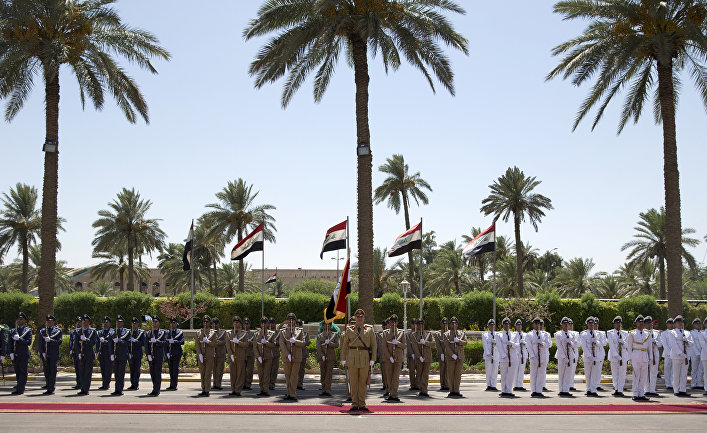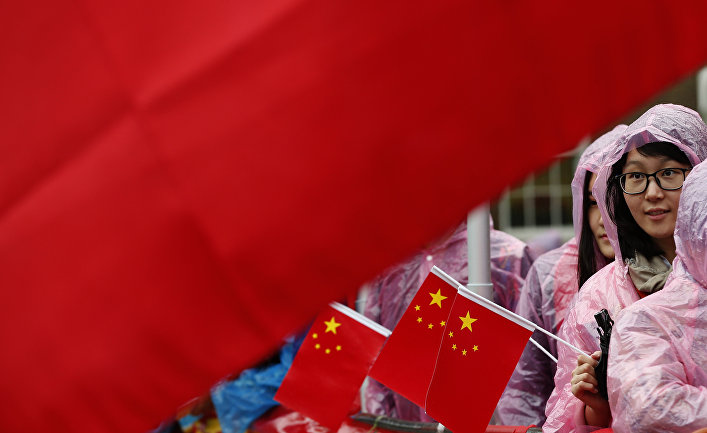The USA is competing with Russia in carrying out a more active foreign policy with the rapidly-expanding state of China. We can see this very clearly in the events going on in the Middle East, in the South China Sea, and in Ukraine.
Re-reading Strobe Talbott's book “The Great Experiment,” there is a quotation that leads to a realization that the seeds of many of the tremendous changes which we are experiencing today were sown long ago. The book cites the conversation that took place in December 2000 between the then-outgoing US President Bill Clinton, and the president-elect George Bush. Clinton told Bush back then that to judge from his electoral campaign, the security issues which were giving him the greatest concern were those of America's relationships with the regime of Saddam Hussein, and his stockpiles of missiles. Bush replied “You're completely correct.” Following through on this valuable policy was interrupted by the tragic events of September 11, which focussed all of America's efforts. Anti-terrorist solidarity arose, with collaboration in the struggle against a common threat, which temporarily redirected any potential friction to a different plane.
It was a time when we all felt Americans, and – as Bush claimed – Putin seemed to be “very plain and trustworthy.” However, it was period which came to an end when the USA announced its withdrawal from the ABM Treaty, and began developing a missile shield to protect itself from Iran. It was decision which didn't go unnoticed by Moscow. The USA, it seemed, hadn't clicked that we were entering the age of a new multipolar world – in which it would be very difficult to bring in the kind of policies hinted at in Bush's terminology without blowback. In 2007 Putin made a very important speech at the International Security Conference in Munich, and with complete clarity stated his opposition to some aspects of international relations which applied at that time. Putin gave a series of examples – including the military intervention in Iraq. Yet one should never forget the importance he placed on missile defense, which he viewed as an intent to weaken Russia and undermine Europe's defense mechanisms.
US missile shield unable to repel massive Russian #ICBM attack – chief of strategic missile forces, https://t.co/ALLRQxyO68 #Russia
— Lars Olberg (@MissileMonitor) December 24, 2015
Three events which took place in the summer of 2008 gave all the appearances of proving that a multipolar world was a real possibility. In August, China – which was hosting the Olympic Games – demonstrated its true greatness to the world. One can clearly recall how we all watched on at the appearance of a new and serious player on the world stage. It was exactly at that time that Russia took its first actions against Georgia, making it very clear that the concept of spheres of influence was still something very real for Russia. It grabbed the attention of the entire world. Then just a month later the bankruptcy of Lehman Brothers, on 15 September, invoked the commencement of an economic crisis from which we have still yet to emerge. It was a crisis whose consequences were felt not only by the world economy, but also within geopolitics too.
At the same time China – whose economy had then been growing at an annual rate of 10% for three decades, quietly sat back and watched as the rest of the world underwent the pains of a financial crisis. Yet whilst establishing as a great power, China somehow gave doubt to Deng Xiaoping's words about the “peaceful rise of the country”. In 2008, China bolstered its position in the South China Sea – which prompted the ire of the USA, as well as putting pressure on neighboring nations with its declarations about its historic rights. Several of these countries have agreements with the USA which guarantee their military security. By the end of 2013 the pressure had reached a higher pitch after China increased its air defenses in regions over which Japan has claims. The USA – which became a Pacific Ocean power after WW2 – treated these Chinese developments as a deliberate provocation. China's demands for sovereignty in these regions can be viewed as a declaration of power in the area – which China regards as its own zone of influence.
A multipolar world had become a true possibility – if only international organizations would acknowledge it. And this is what happened at the G20 talks in Seoul in 2010. Efforts were made to ensure that developing nations would get IMF representation by 2014 that recognized their significance more correctly. However, 2014 has come and gone, and none of what was agreed has come to pass – due to a veto imposed by the US Congress. Not long afterwards, China founded the Asian Bank for Infrastructure Investment. It was a moment when it was felt that the institutions of the global were crumbling – yet the presence of European countries and the resulting discussions in Washington between Xi Jinping and Obama somehow seemed to deny it.

In February 2014 the disturbances in Ukraine spotlighted Moscow's active position even more prominently – which came into conflict with American and European positions, and broke the agreements which have been made at the 1975 Helsinki Security Conference. Following that, when in September this year Putin decided to intervene in the Syrian crisis, the decisive role which Russia can play in this country became clear – and the rest of the players in the conflict stand in need of Moscow's actions in order to reach agreement.
The modern world in the first fifteen years of the twenty-first century is a quite different place from the one which many forecast at the close of the twentieth century, after the fall of the Berlin Wall. Is fifteen years too much, or too little time in the historical perspective, in view of the intenseness of these changes? If we add to the rivalries between the great powers the new situation in the Middle East with its standoff between Sunnis and Shiites, the Arab Spring, the rise of ISIL, and the sufferings of an entire population of refugees, it's no exaggeration to say that the changes we have seen have been enormous.

Despite all of this, international cooperation has made possible considerable progress in two priority areas — the non-proliferation of nuclear weapons, and the struggle with climate change. The agreement reached with Iran on the question of the development of nuclear weapons, and the encouraging results of the Climate Change conference are definitely moments to be proud of. Security agreements are now vitally needed to be sure of a more stable world. The main priority now for us is establishing peace in Syria. We can make progress on this, and other matters, at the peace talks in Vienna.







